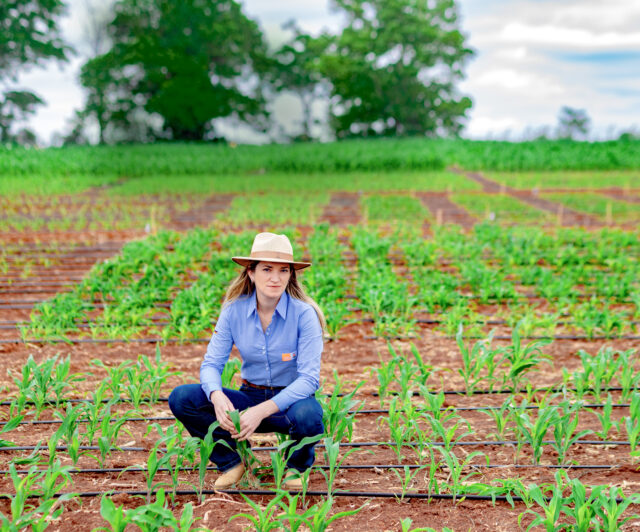
Vania Kulka
Corn breeder
out of passion
Breeding programs are realized at the stations: That is where theory and practice come together, when sowing, pollination and evaluation take place. For Vania Kulka, the build-up of the 32 hectare breeding station in Ponta Grossa is an exceptional task.
When Vania Kulka looks out the window of her office, she can watch her work as it grows. Her gaze wanders over the nurseries and trial fields of the KWS Ponta Grossa breeding station in the state of Paraná. Here she is responsible for the corn breeding program for Southern Brazil. Subtropical climate characterizes the region, which mostly has fertile soils, ideal for agriculture. However, the region is also characterized by very different climatic conditions. This is a real challenge for breeders – and exactly what makes Vania Kulka so enthusiastic about her job.
Back to the roots
In Vania Kulka's family, agriculture has a long tradition: Her father and grandparents were farmers, and until she was 17 years old, she lived on a farm where primarily corn, beans and tobacco were grown. After a two-year intermezzo in the insurance industry, Vania Kulka returned to her roots and began studying agricultural sciences. After graduating from university in 2008, her path led her to the small corn breeding company SEMÍLIA in Campo Largo, where she initially worked as an intern. The following year she was employed as a Researcher. In 2012 KWS took over the breeding companies SEMÍLIA and DELTA and merged the germplasm in a new company.
◼ The corn breeding station of Vania Kulka
Family values
"My boss at that time offered me a position in Cambé near Londrina to manage the station in the north of Paraná. In February 2014, I started a Master’s Degree program; two years later I graduated with a Master's in genetics and plant breeding and was promoted to Breeder. In July 2016 the decision was made to move the station from Campo Largo to Ponta Grossa. I asked if I could move to Ponta Grossa as well. Why? Because this is my home," says Vania Kulka. Being close to her family is very important to her: "In Brazil, the family is the basis for everything. That's why I can identify with the values of KWS as well as closeness and reliability. These are not just words: the owners and the Executive Board of KWS have already visited us and have been so kind to us. That is what makes KWS so special."
Breeding program with three main goals
There are two categories of corn in Brazil: Safra corn, which is sown mainly in September, and Safrinha corn, which is usually sown in February, when the soybean harvest is complete. Vania Kulka's focus is on Safra corn. "My program for breeding corn hybrids for the south of our country is still very young. At SEMILIA we have used very little technology. It was almost exclusively manual work. At KWS we can benefit from the full range of technology. Thanks to these resources we can reach our goal faster. And this season the first three hybrids were launched in the region." The main goals of corn breeding in Southern Brazil are high yield, early maturity and disease tolerance. Especially fast developing plants are crucial for the region in Southern Brazil.
Vania Kulka's team, which consists of 27 colleagues, benefits from KWS' global network of breeders and the available technologies: "We exchange a lot of material with other breeders. Every year we receive new inbred lines from the U.S., Chinese and Argentinian breeding programs, and I also work closely with the breeders in Argentina and China. Our hybrids are tested in other areas including China, África and Argentina. We also work closely with our colleagues in the labs in Einbeck. We recently started using genomic selection, and they also help us as part of marker application in other projects. We analyzing the purity of our lines before we hand them off to the pre-basic seeds department. But the good connection to Patos de Minas is also important: That's where the basic and pre-basic seeds, sales, agroservice and marketing teams work.
"Breeders need passion, knowledge and energy. It is hard work that takes years. I simply enjoy it when I can see the development from the lines to the hybrids. I like to plan in the office, but I even prefer to go out into the field." That’s not far: Vania Kulka's office is right in the middle of the trial fields. |
INFORMATION
KWS in Brazil
Brazil is a country with enormous agricultural potential. For a long time, KWS primarily bred varieties for the temperate climate zone and was not active in Brazil. To have a long-term perspective of success in the corn market, KWS needed three components: Production capacities, an established distribution structure and access to regionally adapted breeding material. In July 2012, KWS entered the Brazilian market for corn seed and acquired the breeding companies SEMÍLIA and DELTA, which it merged into the newly established KWS Melhoramento e Sementes LTDA. At the same time, KWS acquired fifty percent of RIBER, a company with many years of experience in the production and distribution of corn seed. With the acquisition of the remaining shares in RIBER and the integration of KWS Melhoramento e Sementes LTDA, KWS bundled its business in Brazil in the company KWS SEMENTES LTDA. |
© KWS SAAT SE & Co. KGaA 2025


















